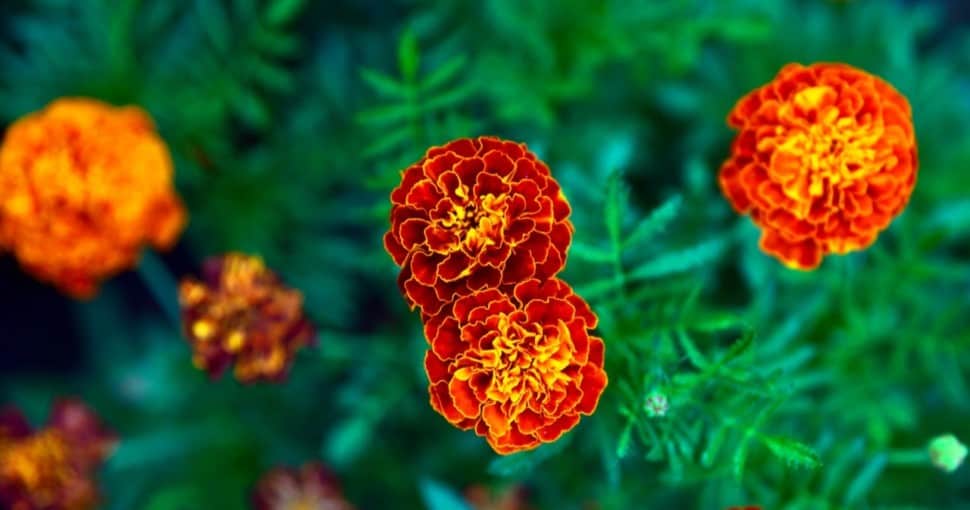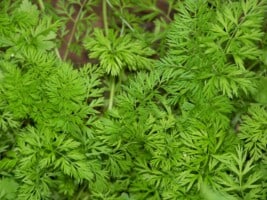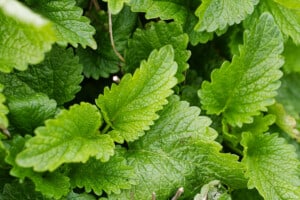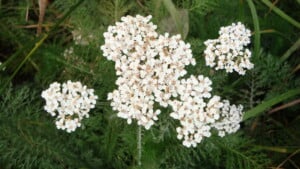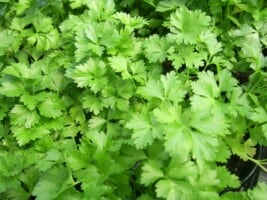From the Tagetes species, Marigolds are one of the few flowers that require little to no attention. The marigold blossoms are cheery, ball-shaped, in colors ranging from yellow, gold, to your reds and oranges, and will bring that touch of color your garden may need.
Contents
These colorful, ball-shaped flowers are not only beautiful but are also widely used in cooking and medicinal treatments. Therefore, they are not poisonous to humans or animals, but mild irritations can occur if the flower is consumed in large quantities.
Suppose you have these cheerful, summery plants growing in your garden but are uncertain whether they are safe for you or your pets. Then this article will assist you with any questions you have on whether marigolds are poisonous or not.
Are Marigolds Poisonous To Humans?
The Calendula variety of Marigolds, also known as the “pot marigold,” is not related to the more common yellow and orange types. It does, however, have medicinal properties. The Mexican tarragon or Tagetes Lucida is related to the common variety of marigolds and is known for its culinary and medicinal uses.
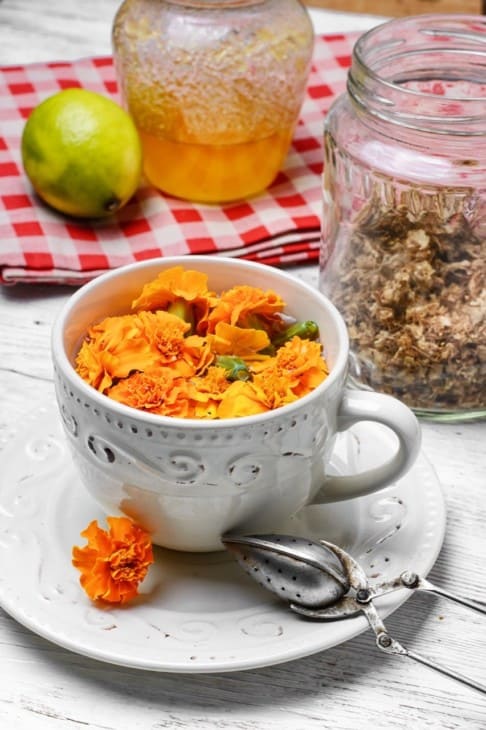
The flowers are edible, while the stems and leaves are used to prepare insect-repelling sprays. Marigolds are often planted alongside vegetables as a form of companion farming to keep away pests. You find them planted around roses to repel aphids.
The dried and fresh flowers are often used in casseroles, bread, and omelets to substitute for saffron. The marigold flowers are considered safe for human consumption and are often used as culinary herbs. Marigold petals and leaves may be consumed raw, blanched, fresh or dry, or in sweet or savory dishes.
There is valuable information on the health benefits of the Calendula or the marigold. As an added advantage to you, it helps if you took the time to learn more about these plants before deciding on using them in your cooking.
Certain parts of the Calendula are edible, while some types of marigolds are considered toxic to humans.
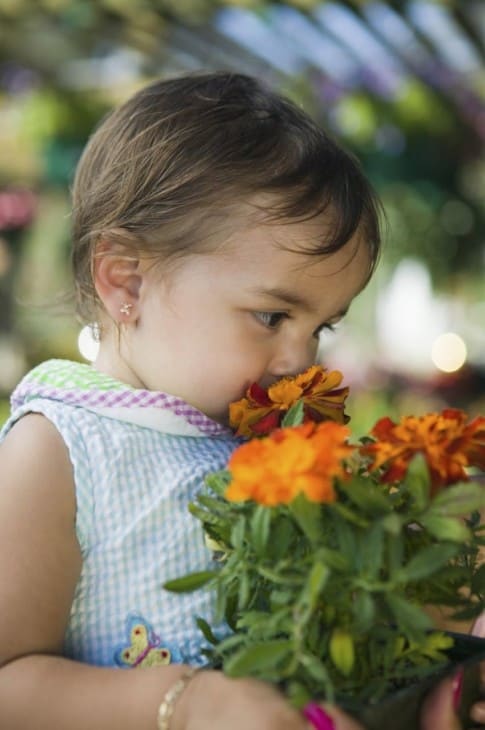
Are Marigolds Poisonous To Cats?
There are two conflicting ideas when it comes to whether Marigolds are poisonous to cats. The Cat Fanciers Association will tell you that marigolds are poisonous, while the ASPCA’s Animal Poison Control Centre will tell you that marigolds are not poisonous.
They each are correct in their way. There are two types of marigolds, the Calendula and the Tagetes species. While the Calendula, your everyday garden variety of marigolds, is non-toxic for your cat, the Tagete species are slightly toxic.
Should your cat consume the leaves or stems of the marigold, it may experience some mild mouth irritation, tummy pain, diarrhea, and possibly drooling at the mouth.
If your feline friend has played amongst your marigolds, wash around the mouth using mild soap and warm water. Should you notice any of the other harsher symptoms mentioned above, it may be good to give your local vet a call, to be on the safe side. Marigolds are not poisonous to cats.
Are Marigolds Poisonous To Dogs?
The marigold plant is considered mildly toxic to dogs. However, this will depend on the variety of marigolds your furry friend has consumed or played in.
The Calendula variety is non-toxic to dogs. But if consumed excessively, it may cause some skin irritation and digestive issues in extreme cases.
The Tagete variety of marigolds, on the other hand, is known to be toxic to dogs. It may cause an upset stomach as well as skin irritation.
In extreme cases, and if your dog has any pre-existing conditions, consuming marigold may cause the following:
- Skin irritation
- Vomiting
- Diarrhea
- Stomach pain
- Irritation of mucus membranes
- Drooling
How To Treat Dogs With Marigold Poisoning
Although certain species of marigolds are non-toxic to dogs, canines’ digestive system is not designed to process foliage and flowers. These flowers may cause a blockage within your dogs’ digestive system that could lead to more significant issues, with severe symptoms.
In many cases, with mild exposure to marigolds, your vet may treat your pet by washing the affected areas and applying a mild soothing ointment, which will be fine.
However, if there is excessive vomiting, your vet will need to administer electrolyte solutions to replenish the nutrients lost during vomiting.
Antiemetics and cathartics may also be administered, so your canine friend may easily pass the flowers and foliage in a bowel movement.
Our pets are not just animals; they become a part of our family. We should therefore take whatever necessary precautions are needed with them by ensuring they are not exposed to harmful plants. Marigolds are not poisonous to cats or dogs.
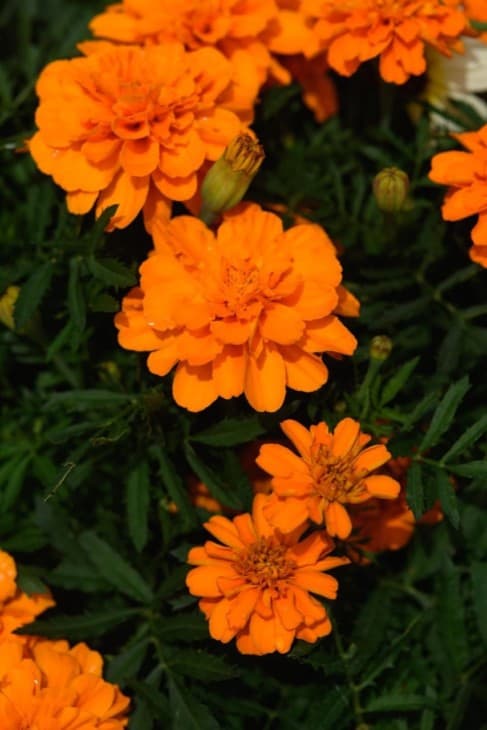
Are Marigolds Poisonous For Chickens?
Choosing to raise chickens in a more humane, organic way means you are looking for alternate ways to boost their immune system and ensure they produce beautiful golden eggs. If you are looking for alternate methods of breeding chickens, all you need to do is add marigolds to their regular feed.
Marigolds are not considered poisonous to chickens; they contribute to the chickens’ overall health.
To beat the competition in producing better chickens and better eggs, many farmers have sought to use chemical supplements and antibiotics to boost the animals’ immune systems.
However, these chemical supplements and antibiotics are known to impact chickens negatively and are proven to have an adverse effect on human health.
Many farmers are choosing alternative methods of breeding animals. Farmers may boost their chickens’ immune systems and ensure that the eggs produced are darker orange by adding marigolds to the chicken feed.
Marigolds are high in antioxidants, which are needed to remove free radicals from the body. For a farmer, this means that you will ensure healthier and better-looking chickens by feeding marigolds to chickens!
Commercial farmers add synthetic pigments to their chicken feed to ensure the eggs yolks are a richer, darker shade of orange. However, an alternative and healthier option will be adding marigolds to the chicken feed. No need for color enhancers; plain old marigold does the trick!
Are Marigolds Poisonous To Livestock?
Marigolds are non-poisonous for many farm animals, including horses, sheep, goats, and cattle. As a farmer, you will need to watch for any symptoms if your animals consume marigolds excessively.
Even though marigolds are considered safe, animals may experience mild skin irritation or an upset stomach. Your veterinarian will help by prescribing a soothing ointment or something to settle the upset stomach.
Marigolds may be safe to have around your farm, but deer and rabbits dislike the intense fragrance of marigolds. Therefore, farmers plant marigolds around their veggie patches as an insecticide and keep rabbits and deer from destroying their fresh produce.
Conclusion
That dwarf-sized plant that brings a splash of color and cheerfulness to your garden may seem inconsequential, but it sure packs a punch. Marigolds are known not only for their beauty, but they have culinary and medicinal uses.
They are commonly used in insecticides and repel insects and pests when grown alongside other plants and veggies. Marigolds are not poisonous to humans or pets and are therefore safe to have around your garden.

